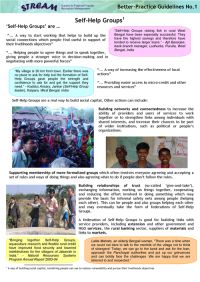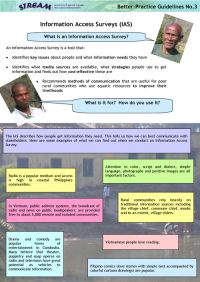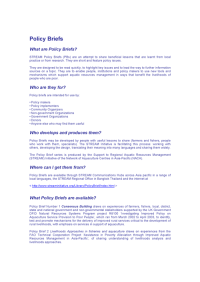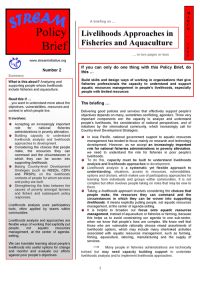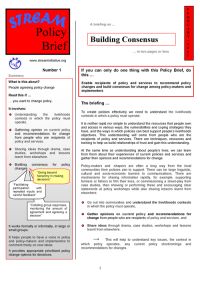Self-help groups are a way to start working that helps to build up the social connections which people find useful in support of their livelihoods objectives, helping people to agree on things and to speak together, giving people a stronger voice in decision-making and in negotiating with more powerful forces. This publication is also available in Bahasa Indonesia, Bengali, Hindi, Ilonggo, Khmer, Myanmar, Nepali, Oriya, Sinhala, Urdu and Vietnamese.
An information access survey is a tool that identifies key issues about people and what information needs they have, what media sources are available, what strategies people use to get information and how cost effective they are. It also provides guidance on methods of communication that are useful for poor rural communities that use aquatic resources to improve their livelihoods. This document is also available in Bahasa Indonesia, Bengali, Hindi, Ilonggo, Khmer, Myanmar, Nepal, Oriya, Sinhala, Urdu and Vietnamese.
Our policy briefs are an attempt to share beneficial lessons that are learnt from local practice or from research, to many more people within Asia-Pacific and to enable people, institutions and policy makers to use new tools and mechanisms which support aquatic resources management in ways that benefit the livelihoods of people who are poor.
In the Asia-Pacific region national government support to aquatic resources management has tended to focus mainly on research and technology development. However, as we accept an increasingly important role for national fisheries administrations in poverty alleviation, we need to consider the choices that people make, the resources they can command and the circumstances in which they can be woven into supporting livelihoods. This means understanding more about people's livelihoods, resources, context, vulnerabilities and objectives.
Consensus-building techniques are particularly appropriate when decision-making is required in a political or emotional environment, or when the decisions affect strong factions with opposing preferences. It can work formally or informally, in large or small group contexts, assisting in reaching agreement on policy change proposals, involving people that are recipients of policy, implementers of policy, shapers of policy and policy makers in defined roles with a process to give people a voice.
